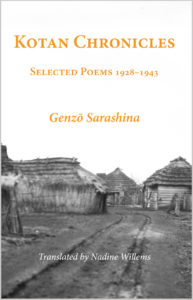 Kotan Chronicles by poet, ethnographer and activist Genzō Sarashina, himself a second-generation Japanese settler in Hokkaido, takes the reader into the lives of the Ainu, the indigenous people of the island, and their interaction with Japanese settlers in the 1920s and 1930s, a period when the traditional world of the kotan, or Ainu village, was being destroyed by the rapid development of the island. With a distinctive and powerful artistic voice, vividly captured in Nadine Willems‘s translation, the poems probe this extraordinary cultural encounter in Japan’s far north, depicting both the beauty of the Hokkaido landscape and the back-breaking work required to survive there in an era of economic hardship. Kotan Chronicles constitutes an exceptional witness of its times.
Kotan Chronicles by poet, ethnographer and activist Genzō Sarashina, himself a second-generation Japanese settler in Hokkaido, takes the reader into the lives of the Ainu, the indigenous people of the island, and their interaction with Japanese settlers in the 1920s and 1930s, a period when the traditional world of the kotan, or Ainu village, was being destroyed by the rapid development of the island. With a distinctive and powerful artistic voice, vividly captured in Nadine Willems‘s translation, the poems probe this extraordinary cultural encounter in Japan’s far north, depicting both the beauty of the Hokkaido landscape and the back-breaking work required to survive there in an era of economic hardship. Kotan Chronicles constitutes an exceptional witness of its times.
‘These valuable translations, prefaced by an expertly written scholarly introduction, provide a compelling and trenchant account of life on the geographic and intellectual frontiers of imperial Japan. These starkly beautiful poems document the complexity of existence at the intersection of Japanese-settler and Ainu historical experience, in years marked by struggle and privation throughout the empire.’ – Paul D. Barclay, Chair of Asian Studies, Lafayette College
‘Such a rare treat – one of the few examples of Japanese proletarian poetry to appear in English. Sarashina’s work, like that of American Objectivist Charles Reznikoff, is a poetry of testimony, one in which he documents the lives of those living in pre-war Hokkaido, often in their own words. To do this, Sarashina allows multiple voices and dialects into his writing, which makes the job of translator especially difficult. This courageous version not only captures the colloquial, multivocal style of the original poems, but also constitutes an important document in the recuperation of pre-war Japanese poetry.’ – Eric Selland
‘Nadine Willems’s introduction is a delight to read on account of its direct simplicity as she tells us of the political background to these poems. She points us to central issues concerning the Ainu people and highlights the close connection “between people and nature” which “mirrors the connection that exists between the physical and intangible worlds.”’ – Ian Brinton, Tears in the Fence
Click here to read the whole review.
Click here to read a sample from this book published in Cha: An Asian Literary Journal.
Click here to read an interview with Nadine Willems by Kris Kosaka in the Japan Times.
Click here to buy from Amazon in Japan: click here to buy from Amazon in the UK; click here to buy from Amazon in the US.
This book is available in both paperback and hardback editions.
July 2017. 108 pages. 8.5 x 5.5. ISBN 978-4-907359-19-5 (paperback) / 978-4-907359-20-1 (hardback)